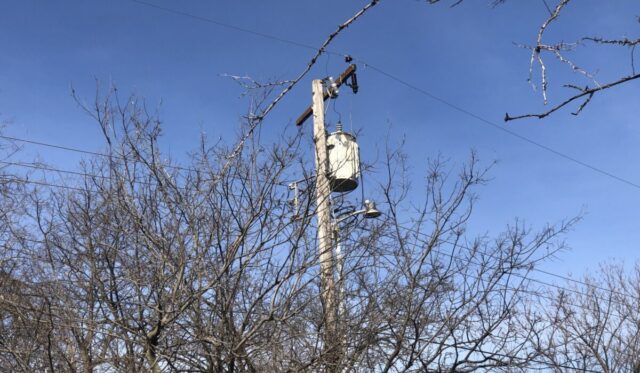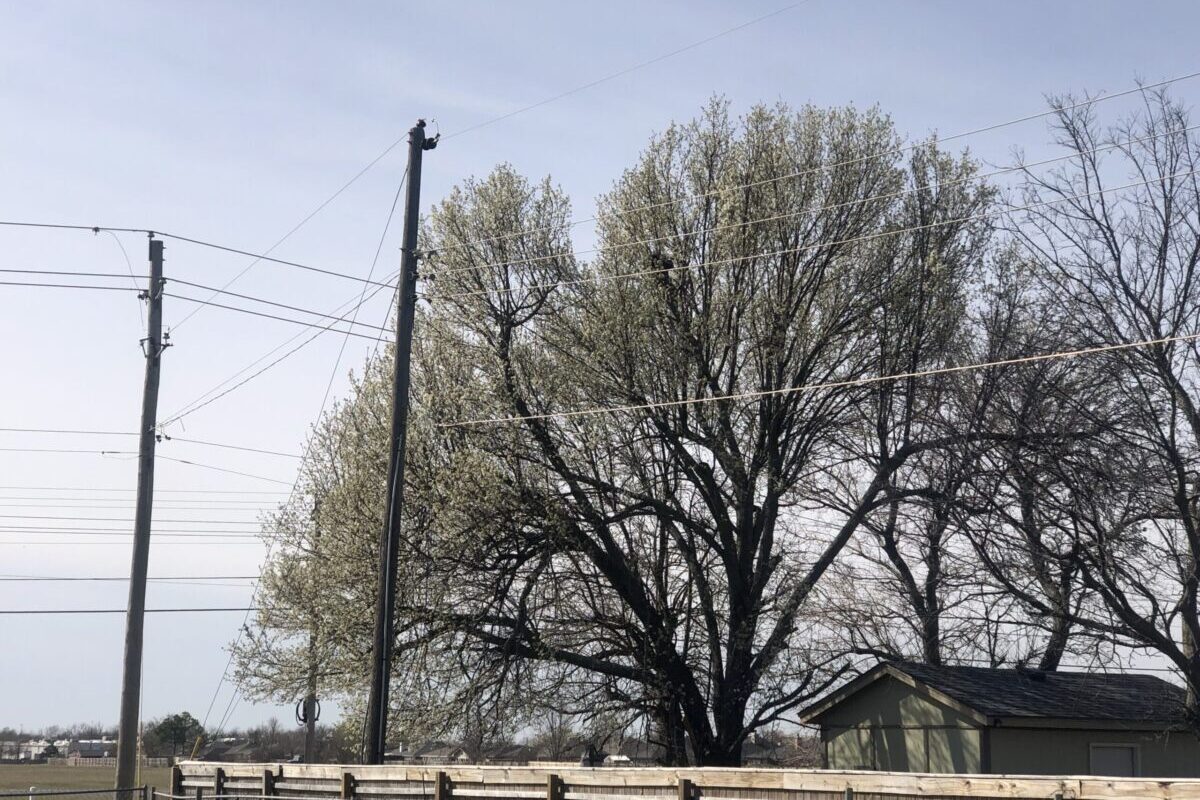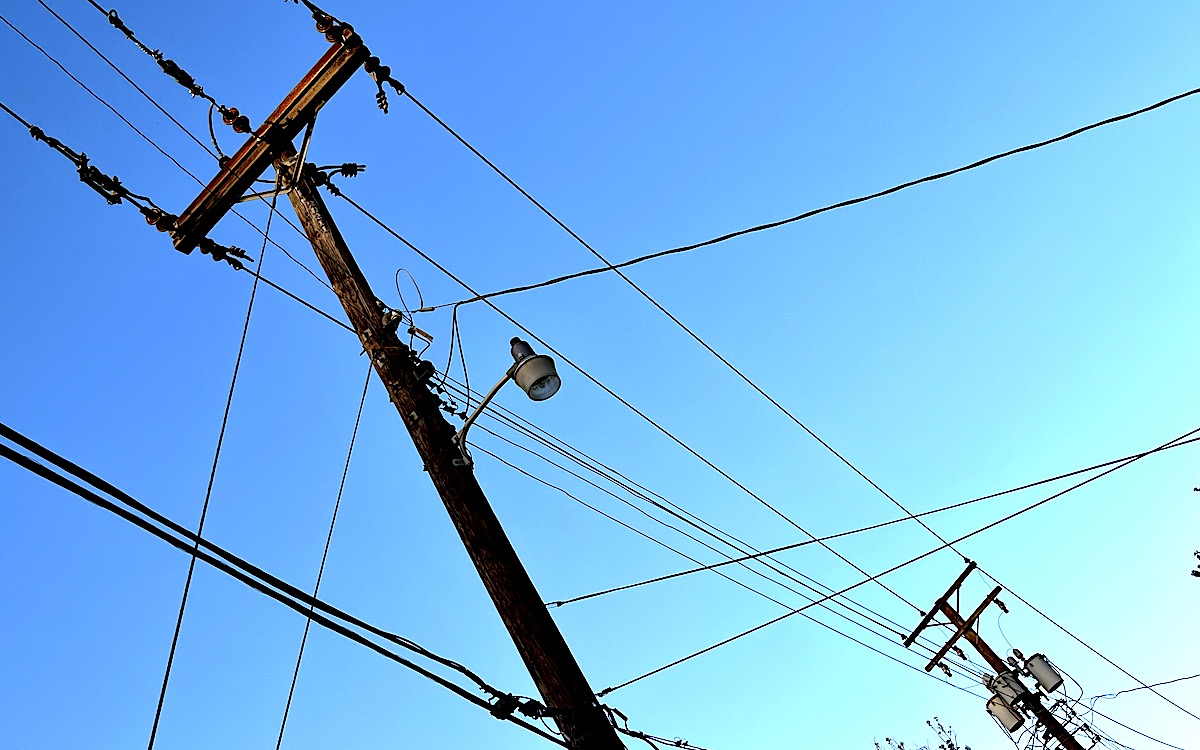
Norman residents will vote again in a special election March 5 to solidify a franchise agreement with OG&E. While the utility and the city’s mayor advocate for a “Yes” vote, other city leaders have shown concern.
Norman’s 25-year franchise agreement with OG&E expired in 2018. A new franchise agreement went to a vote, as required by the Oklahoma Constitution, in January 2023 and failed with 60.71 percent of voters going against the agreement.
Ward 7 Councilman Stephen Tyler Holman, who has been on the council since 2013, said the desires of the Norman community have changed in the last 25 years regarding environmental friendliness, renewable energy resources, tree preservation and electricity reliability.
“Council at the time did not want to send it forward to a vote of the people until changes or a different agreement could be made and negotiated,” Holman said. “We’ve heard feedback from the public for years. This is what the public wants — one of the main things being a plan for burying utility lines. One of the biggest issues with reliability is overhead powerlines, and we have severe weather here often.”
Holman said the Norman City Council has advocated for changes to the agreement that hasn’t changed for 100 years. Those include documented plans to improve infrastructure and a possible shortage in active time of the agreement to ensure public accountability.
Alba Weaver, senior manager of local and community affairs for OG&E, said the company wants a “Yes” vote so it can follow the law.
“The Oklahoma Constitution requires that we have a franchise agreement in order to have access to rights of ways (and) the use of the streets and easements, so we can maintain, repair and restore power to Norman,” Weaver said. “Both the city and OG&E want to make sure that we are in compliance with the law.”
Holman said there have been no issues getting access to power lines since the prior agreement expired. He said the city manager would grant access immediately any time it were necessary.
“I still wouldn’t see an instance where an emergency happens, City Hall’s closed, and we go, ‘Well, too bad. You gotta wait until City Hall opens,’” Holman said. “It would be the city manager granting access immediately.”
The city and OG&E have operated on an “implied” month-to-month agreement where the utility continued to provide power to city residents and businesses. The “implied contract” concept was affirmed by Cleveland County District Judge Thad Balkman when he dismissed a related lawsuit in January.
“I will tell you that not much would change other than just the continuing engagement and relationship with the City of Norman,” Weaver said. “We have been working with them on several other projects. So once we have a franchise agreement, those projects could definitely be solidified.”
Weaver said some of those projects include adaptations to renewable energy and vegetation management.
“Those are two issues that the City of Norman brought to us and that we have been working with for a number of years,” Weaver said. “We have submitted a proposal before the City of Norman, and now they are assessing that proposal, and they are trying to identify some possible land to ensure that project could come to fruition.”
Former Councilman Joe Carter said Norman put forward an amendment to the franchise agreement in 2018 that was turned down by OG&E.
“What we wanted from OG&E is for them to stipulate in the agreement what their plans are for improving the infrastructure, the equipment, the electrical equipment, and service to the City of Norman,” Carter said. “And that alludes to the rolling blackouts east Norman had during the 2010s.”
Weaver said preventing outages is an ongoing top priority of OG&E.
“Today, OG&E’s circuit performance is actually better than our average time for service interruptions,” Weaver said. “That doesn’t mean that we find any outage acceptable, but we do prioritize the work on improving the worst-performing circuits in our service area first. And then we continue to work with the municipalities across our entire service area on their electrical service priorities.”
Weaver said no electrical grid is perfect and that there will always be causes for interruption.
“Whether it’s weather, animals — such as squirrels and snakes — things like that. Vegetation, trees hitting the lines, and there’s always those things,” Weaver said. “But we constantly work to improve our system, and Norman has seen the benefit of our improvements that we’ve made over several years now on our grid.”
Former Councilwoman Alison Petrone, who filed the dismissed lawsuit claiming OG&E improperly collected customer fees since there is no active franchise agreement, said citizen concerns primarily involve burying lines, protecting legacy trees and “poor Norman service.”
“I think each person has their own individual feelings about it,” Petrone said. “Infrastructure upgrades to service in downtown and the east side, because they were having near daily outages. And then there was an environmentalist contingency that wanted more commitments to sustainable energy use.”
In August, OG&E filed an initiative petition to take a renewed agreement to another vote. Norman Mayor Larry Heikkila wrote a letter advocating in favor of the proposal.
“In January of 2023, only [a small] percent of our city’s population went to the polls to decide on renewing the OG&E franchise agreement. That is why I think that we as citizens need more education on what is a franchise agreement,” Heikkila wrote. “Per that agreement, they pay the City of Norman a fee. That fee is about $3 million per year. The city has franchise agreements with Oklahoma Natural Gas and other utilities and service providers. It is not a new idea; Norman has been renewing this agreement since the early 1900s. Fees collected are deposited into the city’s general fund – the chief operating fund of the city.”
If the agreement were to fail again March 5, the city would continue operating under an implied contract until a consensus is reached between Norman and OG&E or the city goes a different direction on electricity provision, an option made more challenging owing to a state moratorium on the use of eminent domain for grid infrastructure.
Customers pay franchise fee
Weaver said OG&E collects a 3 percent franchise fee that is given back to Norman’s general fund. However, the fee is not paid by the utility’s electricity sales. It shows up on customers’ bills.
“(OG&E) collects a franchise fee in the amount of 3 percent, which is roughly about $2.8 million, on average, that is collected and remitted back to the City of Norman,” Weaver said. “And the city basically decides how those dollars are going to be utilized.”
Critics believe that franchise fees should be paid by the utility, not residents.
“There are quite a few people that also believe the franchise fee is supposed to be paid from the profits OG&E is making, not from the ratepayers,” Holman said. “OG&E is paying the city a franchise fee, but that’s a fee that’s been tacked onto our ratepayer bills.”
Petrone said the utility is basically taxing citizens for being a customer.
“That should not be passed on to residents,” Petrone said. “OG&E, you know, that’s the cost of doing business — something that OG&E being a Wall Street company should be paying themselves.”
Carter said the fee should be negotiated as OG&E becomes a more profitable company each year.
“We should be able to see what the profitability of the electrical service in Norman is,” Carter said. “And if they’re not spending money on infrastructure and improvements and repairs, which it looks like they had not done for so long, obviously the profitability is much higher. Under that circumstance, we feel like the city deserves to have a higher rate of compensation for our business. And the contract should reflect that.”
Residents want to ensure care for vegetation

Weaver said OG&E supports the growth of trees, but she said they need to be in the right place and away from lines.
“The trimming is not an ornamental type trimming,” Weaver said. “It is designed to clear lines and ensure that there are no branches hindering any of those lines.”
She said OG&E is working to ensure that the community understands the right type of trees that can be planted a proper distance away from lines and still create a canopy.
RELATED
‘Implied contract’: Balkman boots lawsuit claiming ‘fraud’ under expired Norman, OG&E franchise by Tres Savage
“So, we are very supportive of vegetation and trees,” Weaver said. “It’s not like we don’t like trees. They do need to be planted in the right location.”
Pam Leader, co-chairwoman of the Oklahoma Sierra Club Legislative Committee, said vegetation management with chemical sprays has been an issue, as they can be devastating to vegetation growth and can affect pollinators.
“Just indiscriminate spraying of herbicides kills too much stuff that you don’t really want to kill,” Leader said. “And then there’s runoff that gets into our water supply. It doesn’t just stay in my yard. It runs off, and then it gets down into the creek and kills more plants.”
Carter also said he has concerns about the use of chemicals in the right of ways.
“We don’t want them to do that anymore,” Carter said. “We have legitimate concerns about the use of chemicals in the right of way and how it might possibly affect the health and well-being of our citizens. We want them to put that in the contract and discontinue that practice.”
Utility companies have the legal right to go into the right of ways or backyards without permission, but Holman said doing a better job of notifying residents in advance of administering chemicals might put some people at ease.
“Not notifying people and just being back there and then they come home and there’s a bunch of chemicals sprayed all over their fence and all their stuff,” Holman said. “You can imagine that doesn’t really sit well. Those kinds of things are the feedback we gave them.”
Aaron Cooper, OG&E’s manager of corporate communications, said certified arborists lead OG&E’s contracted tree-trimming crews and contractors.
“Their goal is to ensure reliable, safe electricity for our customers,” Cooper said. “They also seek to preserve and protect trees wherever possible.”
Cooper said the arborists and crews follow industry standards to use the right tools when managing trees and other vegetation.
“In certain circumstances, rather than pruning or removing trees, crews will apply herbicides to minimize impacts to the surrounding vegetation,” Cooper said. “We also use tree growth regulators, a product that slows and regulates the growth of vegetation (by) keeping branches from extending into power lines and equipment while supporting the growth of roots. Our crews follow all label guidelines and do not remove or prune trees treated with herbicides. All of these methods are industry standards used by other electric companies.”
(Correction: This article was updated at 10:30 a.m. Friday, March 1, to correct reference to the origin of the initiative petition and to correct reference to Councilman Stephen Tyler Holman’s tenure in office. NonDoc regrets the errors. A statistic referenced by Mayor Larry Heikkila was also adjust to be more accurate.)





















